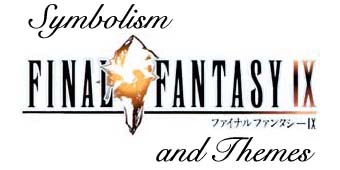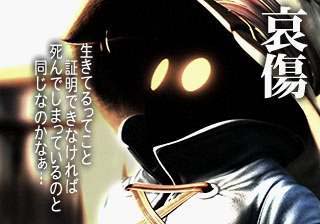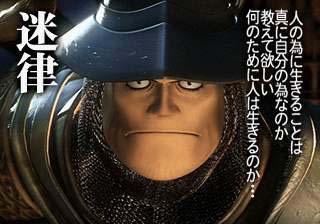

Hi. This is part of the website Otaku Central, made by me. Whilst I am currently redesigning the majority/entirety of the site, I am going to be posting some notes on Final Fantasy IX here. These notes will include translation notes about certain scenes of Final Fantasy IX and the plot as a whole. Also, they will include in-depth discussion and examination of the the themes and symbolism of Final Fantasy IX, which is most likely the most symbolic Final Fantasy there has ever been by far. Today I have a special feature on the symbolism and themes of the game as built and structured through the individual character attributes of the main characters. I hope you enjoy this, it took alot of work. Thanks to Neil for the character pictures.
This document is copyright © of Otaku Central. Please do not use any part of it for your own purposes. If you have any thoughts on any of it, please e-mail me at Otakucentral@hotmail.com.
---------------------------------------------------------------------------------------------------------------------------------------------------

This document is about the deep symbolism that Final Fantasy IX is based on. It goes in depth into the reasoning behind each characters' personality, attributes, and actions throughout the game. Don't worry, it is spoiler free for the majority, though if I feel there is anything remotely close to spoiler material, I will mark it for the convenience of those who have not yet experienced this marvel from Square. Square and specifically Hironobu Sakaguchi and those involved in the make up of the plot, themes, and foundation upon which FFIX is built have put alot of effort into making it very meaningful, symbolic, powerful, moving, and to be learned from. It is something I'm particularly appreciative of.
Ok, this symbolism pertains to the Japanese version. How they will try and best translate the full whole effect into the English version I do not yet know. As you may see a little bit after reading this document, in its (FFIX's) Japanese and true form, there is so much meaning evident, as well as associated meaning. The Japanese Kanji characters representing the individual main characters attributes have so much more meaning than any related word would in English. I'll explain this in each instance throughout this piece.
Ok. Final Fantasy IX's themes, like the FF's before it, particularly Final Fantasy VIII (which I'll be discussing in another document), are about individuals existing within the contexts of the whole, and their own contexts within the contexts of the whole. Contexts within contexts if you would. It is also based on interaction with and feelings upon these contexts and said interaction.
I can't give you my knowledge about such things, but I can discuss them to help you understand them a bit.
In creating Final Fantasy IX, Square have based alot of it on the characters, and for the first time they've created a real world, with great depth, immersion and realism. That the two are in the same FF and game is no coincidence. They go hand in hand.
Each character in Final Fantasy IX has a set pair of Japanese Kanji and a quote which defines them, their personality, attributes, and is the reasoning and motivation behind everything they do in the game, and their very existence. Below I will discuss each characters Kanji and quote, and its relevance to the game and how it helps create the world around them. Don't worry, I will not spoil anything.
Zidane

This is the Kanji and quote for Zidane, albeit in Japanese. I will go through their meanings now. In my Kanji dictionary, the two together were not listed as one word together. This does not necessarily mean that it is not a word, though it could, but it may also mean that it is a very rare word that the dictionary didn't care to list, though it is quite an extensive dictionary, so I think it is not.
A) The first character reads as Shin, or Makoto and its meanings are listed as ; True, genuine, sincere, just, right, due (north), and pure.
B) The second character reads as Tei, or Akira(meru), with the "Akira" part being written as the Kanji, and the "(meru)" part as hiragana. Its meanings are listed as ; Clarity, enlightenment, give up, abandon, resign oneself to.
Zidane's quote reads as : "You don't need a reason to help people".
From these three things we can see the character attributes of Zidane, the main character really. He is well oriented in his life and the world (due north etc.), he is just and sincere, genuine and his intentions pure. He might be a womaniser, but he admits it openly. He is a very open character, and is kind of a guiding light to them all. He has clarity. He has resigned himself to helping others, ie. Vivi and Garnet, and also to his ways, ie. pursuing girls. These attributes define the characters personality, thoughts, attributes, motivations, and the reasoning behind all his actions within the world of FFIX.
Vivi

This is the Kanji and quote for Vivi. Together they are actually a word, and that word is pronounced Aishou, which means sorrow, and grief. This perfectly describes the sullen Vivi. Timid and afraid, unsure of himself and his orgins and his true nature, he is a vunerable and physically diminuitive character who is at once endearing yet afraid. Seperately the characters mean the following;
A) This can be read in several ways. Read as Ai or Awa(remu) it has the following meanings ; Pity, feel compassion. When read in another way, as Awa(re) it has the following meanings ; Pitiable, wretched, sorrowful, piteous.
B) The second character too, has multiple readings and meanings depending on which (no suprise really, nearly all Kanji do). When read as Shou or Kizu it means ; Wound, injury. When read as the word Ita(mu) it means ; Hurt, suffer pain / injury / damage, go bad (food). Finally, when written as the word Ita(meru) it means ; Hurt, cause pain / injury / damage to.
An interesting little aside, when you put the second character with the kanji for heart/intent/mind/soul etc., you get the word Shoushin, meaning heartbreak and sorrow.
These characteristics define Vivi in all the ways Zidane's do him. Vivi is an outcast of sorts, wanting only to be accepted and belong. He craves acceptance and understanding, and is very impressionable. He is very in touch with his emotions, though often times he does not understand them or is in full control of them, and he doesn't quite understand himself. He feels compassion for others, and others naturally feel compassion for him and pity him, people who have played the game should know all to well what I'm talking about. The Ita(meru) reading of the second character alone perhaps shows that Vivi too possesses the power to cause pain and harm to others, even though he is a kind, scared and gentle individual who has such wonderment and fascination at the world, although he is also deeply afraid of it.
Vivi's quote is : "How do you prove that you exist...? Maybe we don't exist...".
I could analyse that and explain it to you for hours, but I won't.
Steiner

This is Steiner's Kanji and quote. As with Zidane's, my Kanji dictionary had no listing of the two together as a word, but their seperate meanings of course speak greatly of Steiner's character, as those who have played the game may understand a bit more. The two Kanji mean the following;
A) When read as Mei and Mayo(u) it has the following meanings ; Go astray, get lost, be perplexed. When read as Mayo(i) it means ; Perplexity, doubt, delusion. When read as Mayo(wasu) it means ; Perplex, lead astray; charm, seduce.
Interestingly, when you combine it with the Kanji character for child, you get Maigo/Mayo(i)go, meaning Lost child.
B) The second character is much simpler, it is read as Ritsu or Richi and means ; Law, regulation; rythm. When used as a verb read as Ris(suru) it means ; judge, measure.
Steiner's quote is : "Having sworn fealty, must I spend my life in servitude?".
Anyone who has played the game knows how well this suits Steiner. This IS Steiner. He has sworn fealty to his Queen, but he has been led astray (though if you saw the Queen I wouldn't say "seduced"). He is perplexed, in delusion. He represents and is the law, shown by the second character, and he judges people all throughout the game, and as his quote shows, even though he has been led astray, he comes to question his allegiances etc..
Garnet

This is the Kanji characters and the quote for Garnet. Unlike Steiner and Zidane, and like Vivi's, Garnet's two Kanji characters do form a word, that being Junshin, which means ; Ingenuous, sincere. This really does describe the beautiful Garnet. She is always sincere, both in her thoughts and her words to others. Seperately the Kanji mean;
A) Read as Jun this simply means ; Pure.
B) See Zidane's first Kanji description, it is the same Kanji as this one. Basically it pertains to purity and sincerity and truthfullness, all of which relate so much to Garnet.
Garnet's quote is : "Someday I will be Queen, but I will always be myself".
The attributes refer to Garnet in so many ways. She has her pure beauty, both outwardly and inwardly. She has a genuine heart and is a sincere and caring person. All of the attributes too, relate to the fact that she is a White Mage.
Frejia

This is the Kanji and quote for Frejia. The two do form a word, which can be read two ways actually, but with much the same meaning. It can be read as Houkou meaning ; Wander about; fluctuate. Or it can be read as the verb Samayo(u) which simply means ; Wander about. Seperately the Kanji mean;
A) This has only one reading. Read as Hou it means ; Closely resemble; wander about, loiter; dim, indistinct.
B) This too has one reading, Kou, and it means (suprise suprise) ; Wander.
Frejia's quote is : "To be forgotten is worse than death.".
Without spoiling too much, all of this perfectly describes Frejia. Frejia has a dim and indistinct past, and she wanders about, alienated from her home. I can't really say more than that. Her quote is very meaningful to her plot.
Quina

This is the Kanji and quote for Quina. The two Kanji do form a word, that being Kyuudou, which means ; Seeking after truth. Seperately the Kanji read as and mean;
A) Read as Kyuu or moto(meru/mu) this means the following ; Want, seek, request, demand.
B) Read as Dou or Tou, this means ; Road, prefecture (as in Hokkaido). Read as Michi it means ; Way, path, road, street.
Quina's quote is : "I do what I want! You have problem!?".
Quina's Kanji and quote speak of a resoluteness and of will power to go after what he/she wants. Perhaps translated as the path of desire, Quina goes after what it desires, and isn't going to back down about it. There's something to be learned from this.
Salamander

This is the Kanji and quote for Salamander. Together they do form a word, that being Kashin, which means ; Put too much confidence in (something). If anyone has played the game or read earlier released character descriptions, they know that Salamander prefers to fight alone, and does not want to rely upon others. He depends on his strength, not other people. Perhaps he places too much confidence in his own abilities, and too much confidence and belief in that you don't need others. Similar qualities to Squall Leonhart. Seperately the Kanji read as and mean;
A) Read as Ka it means ; Excess, too much; error. Read as Su(giru) it means ; Pass, go past; elapse; be more than, exceed. As and adjective or verb suffix it means too ------- (ie. too much), over -------- (ie. over confidence, over spend etc.), and to excess (exceed). Read as Su(gosu) it means ; Spend (time). Read as Ayama(tsu) it means ; err (re; to err). Read as Ayama(chi) it means ; Error. And finally, when read as Yo(giru) it means ; Pass by.
B) This is only read in two ways, and has the same pronounciation as the Kanji character Zidane and Garnet share in common, even though Salamander's is a different character, word, and has different meanings. That's why you need Kanji in Japanese, because some words are written the same in Hiragana and are pronounced the same, and you need the individual Kanji to distinguish them. Anyway, read as Shin it means ; Fidelity, sincerity, trust, credit, reliability. Read as Makoto it similarly means ; Sincerity, fidelity.
When the second Kanji is used as a verb, written as Shin(jiru/zuru) it means ; to believe in.
Salamander's quote is : "The only dependable thing about the future is uncertainty.".
What these Kanji characters, together and seperately, and this quote show us is that Salamander is a loner, one who believes in his own strength wholly, and does not like to rely upon others. He's put too much trust and credit in his own ability (abilities), and he is over reliant upon his own strength. Over time his character will perhaps grow to realise that it is not weak to rely on your friends sometimes, and trust in the individual strengths and abilities of others.
Eiko

This is the Kanji characters and quote for the young Eiko. Together they do form a word, that being Kodoku, which means ; Solitary, isolated, lonely. This perfectly describes Eiko. Seperately the Kanji read as and mean;
A) Read as Ko, this means ; Alone; orphan.
B) Read as Doku this means ; alone, on one's own, Germany (don't ask me to go into why they chose that Kanji for Germany, unrelated anyway). Read as Hito(ri) it means ; Alone. Read as Hito(rideni) it means ; by itself, of its own accord.
Interestingly, when it's written as Hito(ribotchi/ripotchi) it means ; All alone. Also, when combined with the Kanji for child, read as Hito(rik)ko/Hito(ri)go it means ; An only child.
Eiko's quote is : "I don't wanna be alone anymore...".
All of these attributes so define Eiko. She is desperately afraid of being alone, she is an orphan, the only human living in a village of Moogles. A solitary, isolated both physically and emotionally, and lonely child and character, through her interactions with others and the outside world, she may grow as an individual.
---------------------------------------------------------------------------------------------------------------------------------------------------
Ok, that does it for now. This is but a brief and trying to be spoiler free discussion of the symbolism of the characters that define the world and in turn are defined by that world, of FFIX. The character quotes have a whole much deeper meaning themselves, which are close to the whole meaning of the themes of FFIX, and are quite similar to themes expressed in FFVIII, although in FFIX, they are, as is everything else, more thouroughly fleshed out. I will soon discuss the character quotes meaning(s), but until then I think this is sufficient.
I also wish to note that I think the Kanji have more meaning here than any single word in English could in this instance. Not only do individual Kanji have their own meaning, but when looking at a Kanji, its meaning is often not specific, it has different senses of meaning. When one looks at a Kanji, they can associate it with certain things, ideas, not to mention certain other words/ideas related to that Kanji, and/or other Kanji that usually go along with that Kanji. I don't know if this is a problem or not, as of course in English too, we can look at a word and think of ideas, concepts, and associated words, feelings, ideas etc.. But still, the Kanji here seems to mean more symbolically, and unless they put more than one word on these screens in the English version, I don't think it will have as much meaning. Certainly it won't be the same. But I think Square knows how to do it, and I trust them to figure it out. I'll see I guess.
This document is copyright © of Otaku Central, and please do not use any part of it for your own purposes. If you have any thoughts, e-mail me at Otakucentral@hotmail.com.